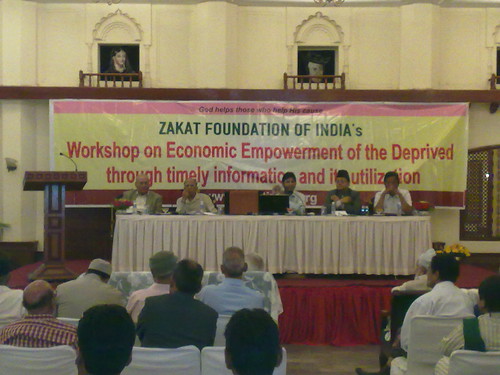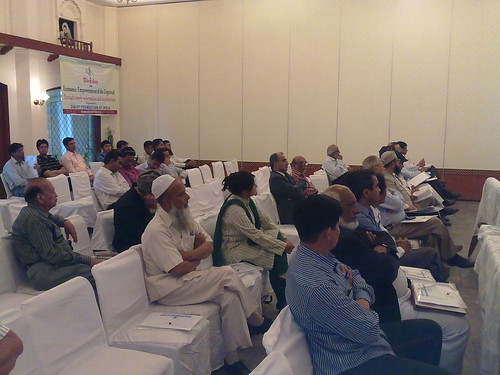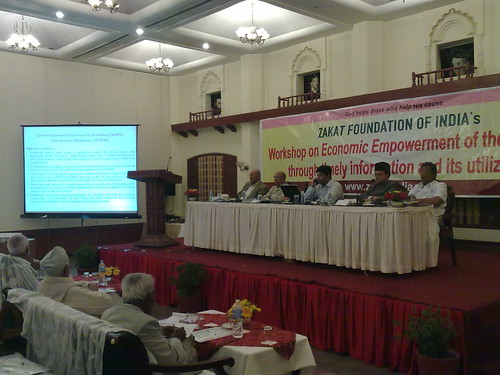By Pervez Bari, TwoCircles.net,
Bhopal: Muslims are drenched in poverty and illiteracy not due to lack of funds available with the community but it is the indifference and indolent approach to life coupled with ignorance which have made them vulnerable in society and open to many vices, said Syed Zafar Mahmood, president Zakat Foundation of India (ZFI), and urged the elite of the community to come forward to fight the challenges.
Dr Mahmood was making a Power Point presentation at ZFI’s 11th National Workshop on “Economic Empowerment of the Deprived through timely information and its utilization” on Tuesday at Noor-us-Sabah Palace Hotel here in Bhopal.
The purpose of the workshop was to create awareness among the participants about the welfare schemes launched by the governments of the day for the minorities and impart training as how to use the Right to Information, (RTI), Act to monitor the implementation of these schemes.

Along with Dr. Mahmood, others who graced the dais included: Justice (Rtd.) Mr. Faizanuddin, Mr. Iftakhar Ahmad, MD of Bhopal Glue factory; Mr. Sikandar Hafeez Khan, chairman of Reliable Group of Industries; Mr. Nisar Ahmad Tamboli, a social activist from Maharashtra, Tariq Qamar, Head of the Monitoring Department of ZFI; and Mr. Wasim Akhtar (IAS Retd.).
Elite should come forward
Dr. Mahmood through his presentation impressed upon the participants that it is imperative on the elite class to devote their precious Time, Resources, Assets, Income and Love, which he abbreviated and coined as “TRAIL”, for others in the community who belong to the have-nots category to uplift their lot. He quoted profusely the various Ayats from the Holy Qur’an, effectively interspersed with couplets of Allama Iqbal to suit the situation, to arouse the moral obligations of the participants to at least part away with one-third of their TRAIL for the needy who have not been fortunate enough to have two square meals a day in peace.
To drive home the point he quoted Ayat of the Holy Qur’an 2.219 which says give to others what is beyond your needs to emphasize on the participants that they have been blessed by Allah’s bounty both intellectually and materially as compared to a rickshaw or a cart puller who has to labour hard all day for his sustenance. So, the poor have right of their share in whatever we have and we are not supposed to hold it back. So, Islam says whatever we have extra than our own needs should be parted away for the poor in the community so that wealth circulates in the community for the benefit of the have-nots in the Ummah.
Use RTI as a tool to monitor welfare schemes
Dr. Mahmood, who was Officer on Special Duty with Sachar Committee, said it is very vital for the citizens to monitor the government’s welfare schemes to see that these are implemented in letter and spirit for the benefit of the minorities. He urged the participants to wake up from deep slumber and realize their responsibilities towards society. The RTI Act is a powerful tool now available with citizens to put pressure on the bureaucracy to implement the welfare schemes in fixed time frames without indulging in dilly-dallying tactics, he emphasized. He moaned that in the Indian Civil Services, judiciary and government jobs only about 1 to 4.5 per cent Muslims presence are there. It is not due to any bias but lack of interests, attitude and approach shown by the community as only 0.5 per cent of the 13.4 per cent official Muslim population, according to 2001 Census data, take the examinations, he pointed out.

How to increase number of Muslim civil servants
Dr. Mahmood revealed that Jain community which is a miniscule as compared to Muslims has collected 13 million dollars for preparing their youth to appear in the Civil Services examination. He said that if Muslims take up the challenge and exhort their youth in large numbers to prepare for these examinations such as IAS, IPS and other allied services then their ratio in the bureaucracy would increase. This in turn will upswing the affect on the overall improvement of the condition of the community. “It is the bureaucracy which plays a pivotal role in overseeing the implementation of national policy and resource allocation of the government”, he remarked.
He said ZFI is running Sir Syed Coaching Centre in New Delhi wherein it selects and sponsors the coaching of a limited number of ‘ZFI Fellows’, i.e. academically meritorious and financially deserving candidates with an interest in appearing for the highly competitive Civil Services examination conducted by the Union Public Service Commission of India (UPSC). The candidates are selected after an extensive application, test and interview process. They are encouraged to gain admission to premier coaching institutes of Delhi such as Vajiram, Synergy, Sri Ram, Ensemble, Interactions. Their fee is paid by ZFI directly to the institutes.
Now, ZFI intends to establish its own coaching centre in its own building for preparing 500 students every year for civil services and other competitive examinations for which funds are needed, he added.
The backwardness of Muslims economically and educationally is not due to lack of funds but the community’s virtual ignorance about the different welfare schemes run by the governments at the Centre and the state level. The Muslim Ummah fails to take advantage of these schemes as a result of which funds worth crores of rupees gets lapsed, he opined.

He said in order to instill awareness in the Muslim community ZFI has offered to establish a furnished reading room-cum-information centre having a computer with internet facilities in Masjids all over India wherever a room or a hall is made available to them. This will be christened as “Darul Mut’ala-wa-Markaz-e-Ittela’aat”. The Masjid committees can contact the ZFI with applications to this effect. About 100 applications have been received from all over India so far for this project, he added.
Sachar recommended formation of Indian Waqf Service
Dr. Mahmood lamented that the Ministry of Minority Affairs turned down Sachar Committee’s recommendation of forming Indian Waqf Service to create a new cadre of Waqf officers, on the lines of the civil services, so that the state Waqf boards and Central Waqf Council would be managed better. The Ministry turned down the recommendation, saying a new cadre is neither practicable nor legally feasible, he pointed out.
He revealed that using the RTI Act he filed an application and found how the recommendation was rejected without discussing its merits. It was found that a deputy secretary with Ministry of Minority Affairs had struck down the recommendation for an Indian Waqf Service in three sentences,” he said.
The Deputy secretary Virendra Singh had in his noting had observed: “The state Waqf board has the autonomy to decide the number of personnel, their deployment status or pay. The state boards do not have a defined relationship with the CWC (Central Waqf Council) unlike the position between the states and the central government and, therefore, replication of an all-India cadre on the lines of the IAS is not practicable. Amendment to the Waqf Act to induce the envisaged centralisation may neither be legally feasible nor desirable.” Subsequently Cabinet note had only four words: “This is not recommended.” As such it was not felt necessary at any higher level to hold any discussion, Dr. Mahmood said.
Meanwhile, it may be pointed out here that Justice Rajendar Sachar, who headed the Sachar Committee that prepared a status report on Muslims in India, had said: “There is no legal hurdle in creating the Indian Waqf Service”. The Art. 312 of the Indian Constitution clearly provides that Parliament may by law provide for the creation of one or more all-India services common to the Union and the states.
Rajendar Sachar had said his committee had found “a severe shortage of senior government officers who are Muslim to manage Waqf affairs. A separate cadre would mean officers who are not only permanent but also qualified enough”.
Most of the 27 state Waqf boards are headed either by not-too-highly qualified CEOs or by government officials holding the post as additional charge. The Sachar Committee had said: “up to 200 Group A officers are needed to service the Waqf affairs across India ” and recommended, “The government may, therefore, consider creating a new cadre of officers to be recruited by the UPSC so that they can deal with the specific affairs of the Waqfs efficiently.”
It is observed that some of the Waqf board heads in the country are very poorly educated personnel. For example the Puducherry Waqf Board chief is A Sherfuddin, who is only a matriculate while that of Andaman and Nicobar Mr. Mohammad Akhtar Hussain is only higher secondary and is in ex-officio capacity. The Tamil Nadu Board chairman is a literary figure viz. Mr. Khaleelur Abdul Rahman, who is a poet and a writer.
It may be mentioned here that as per Sachar Committee Report there are 6 lakh acres of Waqf properties across India of which total area of 4.9 lakh registered. The Book Value written a century back was Rs. 6000 crore which translated into the current market value is whopping Rs. 1.2 lakh crore. The current annual income of the properties is Rs. 163 crore while the potential annual income should be around Rs. 12,000 crore, the Sachar Committee Report noted.
Bhopal Muslims forms a ZFI-like group
Meanwhile, spurred by the exhorting of Dr. Mahmood and his other team members’ presentations the participants came up to form an ad hoc body at the end of the workshop to work for Muslims in Bhopal and later in Madhya Pradesh on the lines of ZFI to uplift the community from the morass of ignorance and poverty. The members of the ad hoc body are: Mr. Iftakhar Ahmad, Mr. Sikandar Hafeez, Mr. Wasim Akhtar, Mr. Mazahir Malik, Mr. Ishrat Siddiqui, Prof. Fauzia Arshi, Mr. Pervez Bari, Mr. Nadeem Anwar and Mr. Abdul Tahir (convenor).
Justice Faizanuddin speaking on the occasion stressed that the information and knowledge gained at the workshop should be utilized for the betterment of the community then only it would become meaningful. He state that three things viz. (i) economic condition, (ii) educational condition and (iii) social status of any community go to shape its place in society.
If economic strength is the backbone of a community then Muslims are without a backbone which is quite evident to one and all seeing their poverty, he opined.
Mr. Wasim Akhtar said that this era being of information and networking it should be utilised tactfully to uplift the minorities, especially the Muslim community which is lagging far behind in all walks of life. He called to replicate the ZFI success story which is doing a yeoman’s service to make Muslims live a life of dignity.
The workshops were successfully completed, earlier at Delhi, Bahraich, Lucknow & Rampur (all three UP), Patna (Bihar), Ranchi (Jharkhand), Mumbai (Maharashtra), Kolkata (West Bengal), Malappuram & Calicut (both Kerala). Now, after Bhopal it would to be held in Srinagar (J & K) on March 20.
It may be mentioned here that Zakat Foundation of India was established in 1997 as a grassroots level organization by concerned residents of New Delhi. It is a Non-Governmental/Non-Profit Organization which collects and utilizes ‘zakat’ or charity for socially beneficial projects in a transparent and organized manner. ([email protected])

